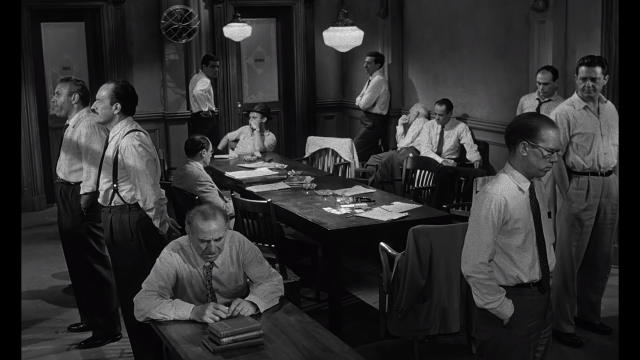One of the things said on this site that stuck with me was when Babalugats remarked that the only thing that never changes is human nature. The basic conceit of 12 Angry Men is that twelve ordinary people feel qualified to have a discussion on a subject that is completely abstract to them; a theoretical remake would only have to hold onto the detail of jury duty to make the exact same overall point. This is the story of eleven men being stripped of the illusion that what is obvious to them is obvious to all. #8 is the only of them not to call for a guilty verdict, not because he specifically believes the man is innocent, but because he’s uncertain. What quickly becomes clear is that none of the other men can easily articulate their beliefs, either quickly jumping on a prejudice of some kind or are simply going along with the crowd, and #8’s committed skepticism combined with the dramatic context of jury duty forces them to justify their perspective with the facts. The increasing confidence of #9 and #2 is fun to watch, but I also get a kick out of #12 shifting from sleazy ad exec charm to awkward, mumbling fear as he realises how out of his depth he is. The human thought process is not nearly as elegant or as complex as we believe it is, and this movie shows the real, painful, humiliating process of interrogating a stance. What particularly interests me is how necessary this movie is in the age of the internet, and in particular in the eternal debate of logic vs emotion.
We’ve all seen or had to deal with a certain strain of white guy who proclaims himself a paragon of Logic and Reason, believing that he has tossed out petty emotion in favour of perfect reason. Of course, where this falls down is that the number of people who actually are entirely free of emotion, feeling no fear of death and no hatred of life, is so low as to effectively be zero, and these men, by refusing to recognise their emotions, are often completely at the whims of them. They get outraged that people aren’t indifferent to the things they’re indifferent to, and they’re outraged by People Who Are Wrong, if they’re not outright petulant at people not celebrating them as the Smartest Guy In The Room. #3 doesn’t get as bad as all that, but he is on that scale, starting out as a strident defender of the facts and, by the end, screaming at the other men that his viewpoint is based in the facts when it’s nothing more than his hurt feelings about his son infecting his interpretation of them. Of course, there’s also the flipside. You may know that I was a regular Tumblr user in the first half of the 10’s, and the corner of it I explored happened to reject not only that particular kind of white guy, but the rationality he prizes. The thing though, is that a total rejection of reason meant that a new argument cropped up every couple of days because two people disagreed on something and, rather than trying to explain their stance, would simply try and dominate each other with an increasing vigor (if the facts of the situation showed up, this was usually when – “you’re not just wrong, you’re stupid!”). Worse, there were often situations where angry mobs and arguments broke out over things that were either blown out of proportion or, worse, never happened, and a quick check of the facts could have saved a whole lot of trouble. I usually point to Always Sunny to explain what that experience is like, but in the case of this movie, imagine two different variations on the ramblings of #10; trying to appeal to someone just based on how the world is obviously supposed to be with no interest in – no, with genuine offence at the idea of analysing the facts. It’s more honest than the Rational And Logical but just as useless and destructive.
What the film shows is people using reason to guide emotion. The central thing that pushes many of the men towards the end is a fear of sending an innocent man to die, something that only affects them on the same abstract level the crime itself does. There’s a level on which this film can be viewed as the work of a society, with almost every man contributing something unique to the overall process of refining the timeline of what happened; for all the flash of the closeups and telephoto lenses, my favourite technique Sidney Lumet uses is the mid-shots that show one character talking while another sits and listens, working up the nerve and emotion to say something, with my favourite specific example being #5 working up the nerve to complain about the way they’re all talking about people who live in slums. But there’s also a sense in which it shows what a single consciousness must do, with the room acting as a mind and the jurors standing in for the many impulses one can have – impulses towards ego, prejudice, skepticism, curiosity, laziness, reason, and goodness. Emotion without any reason can just be prejudice, goodness requires reason if it must be effective, and reason without curiosity or goodness can lead you to killing an innocent man. 12 Angry Men goes beyond the universal and into the elemental, showing the fundamental process of thought. When the twelve men disperse into the crowd and back into anonymity, there’s a sense that they will never be able to stop that process again.

